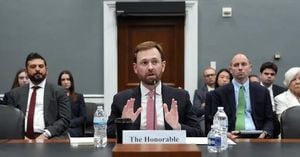Across the United States, the child welfare system is facing unprecedented challenges, igniting calls for urgent reforms to protect vulnerable children and support struggling families. Recent developments highlight increasing concerns about children's safety and well-being, alongside efforts at various state levels to improve existing practices.
One significant legislative proposal currently before the Texas Legislature aims to reshape how Child Protective Services (CPS) operates. Sponsored by Houston Rep. Lacey Hull, House Bill 2216 would establish stricter requirements for child removals, emphasizing family preservation as the foremost priority. This legislation mandates the state's child welfare agency to make "active efforts" to keep families intact before considering the removal of children—a notable shift from the existing requirement of "reasonable efforts." Hull characterizes this bill as foundational, asserting it would set the "Gold Standard of due process for parents and families involved with child protective services." It also addresses the current burden of proof needed to terminate parental rights, elevates it to "beyond a reasonable doubt," paralleling standards found within the criminal justice system.
The proposed reforms are being described by state and national experts as "transformational". They push for overdue changes amid rising critiques of the child welfare system’s efficiency and effectiveness. According to Hull's office, if passed, over 15,000 children currently involved with CPS would immediately benefit from the enhanced legal protections provided by the new standards.
Beyond Texas, Kentucky's struggles to house children under state care have been starkly laid bare. A recent report indicated at least 49 children spent nights sleeping within buildings operated by Kentucky’s primary social service agency. The findings showcase systemic failures and have prompted calls for urgent action. "We need to open more options right away," said Allison Ball, Kentucky’s auditor of public accounts, explicitly identifying the lack of available placements as unacceptable. On average, the 49 children reported each spent about four days who were housed, with one child staying 35 days. This raises significant questions about the overall capability of the system to protect children effectively.
Meanwhile, South Carolina is also facing challenges as the demand for stable, loving homes for children remains high. According to the South Carolina Department of Social Services, there are currently over 3,000 children on the state's care roster. Lakeshia Bryant-Seabrook, coordinator of Lowcountry License and Support Team, highlighted the need for more families, particularly those willing to support larger sibling groups and medically fragile children. “It takes a special kind of person to be a fostering parent,” she emphasized, reflecting on the emotional challenges and rewards of fostering. Despite efforts, the need for qualified homes continues to grow, as approximately 2,000 children are still awaiting placements.
Youth Villages, a leader in children’s mental health services, echoes this demand for more engaged families. They are actively recruiting compassionate individuals willing to become fosters for children facing various challenges. Targeting statewide gaps, they offer extensive training and support to those who dare to take on this fulfilling task. The initiative aims to provide stability and continuity for children torn from their familial roots, seeking to keep them with siblings and connected to their communities.
Statistics across the U.S. reveal broader issues within the child welfare framework. Reports indicate one out of four children will need some form of social care support by the time they reach adulthood. This startling realization points to systemic failures exacerbated by issues like poverty and funding cuts, prompting experts to advocate for policies focused on improving living conditions for families.
Dr. Matthew Jay from University College London notes the potential for over 50% of children needing intervention services in poorer regions—a stark wake-up call for policymakers. “Improving socio-economic conditions will significantly reduce the reliance on child services,” Dr. Jay explained, urging for sweeping reform focused not just on crisis management but preventive care.
Across the board, experts stress the importance of family integrity amid tragedies of forced separations. Vivek Sankaran, director of the Child Advocacy Law Clinic at the University of Michigan, sharply criticized the status quo. “By raising the burden of proof for terminating parental rights and ensuring the nuances of poverty are not conflated with neglect, this legislation reflects the necessity of protecting familial ties,” he stated, reinforcing the sentiment echoed by Hull’s proposed bill.
To summarize, the alarming circumstances surrounding child welfare systems across the United States beckon urgent reforms and innovative solutions. Legislative changes proposed, combined with extensive outreach efforts, exhibit pathways toward meaningful transformation. Yet at the same time, the systemic failures unveiled by reports from multiple states serve as reminders of the work still needed to secure safe and loving homes for all children—an endeavor no child should face alone.



